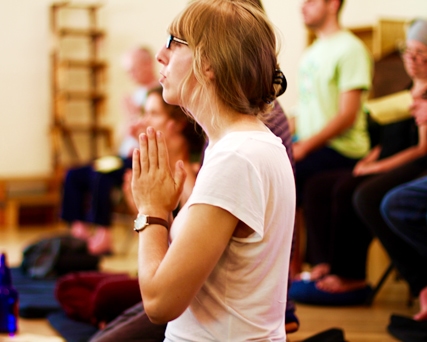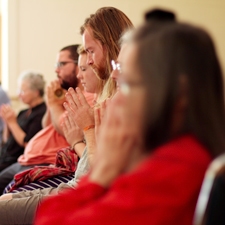Every November, we host a weeklong silent meditation retreat themed on generosity and gratitude. In this spirit, we do not charge a fixed rate for the retreat, but instead ask for donations of food. The cook then only uses the food that is given to craft the meals for the week. A container woven together from the generosity of the Sangha, we enter the retreat aware of and opened to the dance of giver, receiver and gift, somehow sitting on the apex of each.
“To truly know kindness, you must lose things.” Naomi Shibab Nye
Perhaps this is why generosity and gratitude appear so intimately entwined. When we give, we feel happy, we feel grateful. This works on a deeper level too. Our practice, especially during sesshin, asks us to give ourselves up to, over to, into.

Hoben would recite to us at the top of the hour, as we re-crossed our legs, plumped our cushions, straightened our spines and settled into presence, Tilopa’s Six Words of Advice.
Let go of what has passed.
Let go of what may come.
Let go of what is happening now.
Don’t try to figure anything out.
Don’t try to make anything happen.
Relax, right now, and rest.
When we are relaxed, open and present—awareness dawns and all-inclusive gratitude shines forth. We become aware of the great fullness of the sense world, as colors beam radiant and the voices of all beings sing the song of our awakening.

The ten thousand dharmas advance and realize the Self.—Dogen
“That wall is just so beautiful,” Brandon says of the golden cream cinder block wall in the zendo. “It’s just that we are kind of in love with each other.”
Practice asks the question, can I be grateful for this—for this heartbreak, for this election, for this bruise, this broken promise, for this relationship? To be truly grateful for life itself, we come to fully accept the life we are living, just the way it is. This is part of the practice of sesshin, allowing one’s self to rest so deeply in presence, that the center—the reference point from which we view ourselves and the world—falls out, and then it is just gratitude down to the bottom.

Chozen says that she knows someone is truly turning a corner in the practice when all they can do is express the heartfelt gratitude for their lives and the practice—how can we repay this debt of gratitude? And what if we aren’t always aware of the gratefulness, sustaining and giving life to our lives?
Gratitude, like all virtues, can be practiced. Here are a few practices from the Sangha:

1. Every evening list 5 things you are grateful for from the passing day. Or more imminently when you notice that the mind has slipped into negativity or self-centeredness, open the body posture and bring to mind one thing in that moment that you are grateful for.
2. Write a poem or song of all the people, places, things or virtues that you love. Recite or sing this whenever you need a reminder.
3. Gratitude ABC’s borrowed from gratefulness.org. Write any word that comes to mind for each letter of the alphabet. Then go back through the words and see what each can teach about gratitude.
4. Ask friends and family, even strangers what they are grateful for.
5. Be quiet, open and receptive, listen to the not so obvious voices around you, and enjoy simple happinesses or pleasures.
6. Give. Give a hug. Give a smile. Give some money to charity. Give a hand. Give time. Give a loving ear. Give a compliment. Give a gift. Volunteer. Help a friend. Be open-hearted, open-handed, interested, honest and kind.
7. Greet each moment, person and situation with the attitude, “Thank you very much, I have no complaints.”
